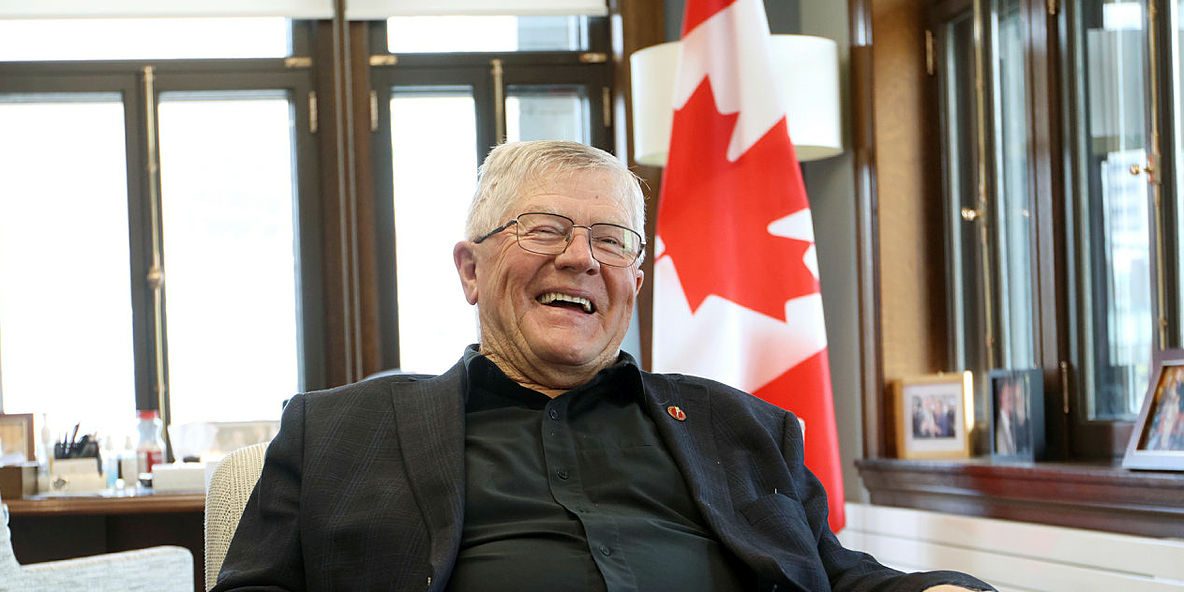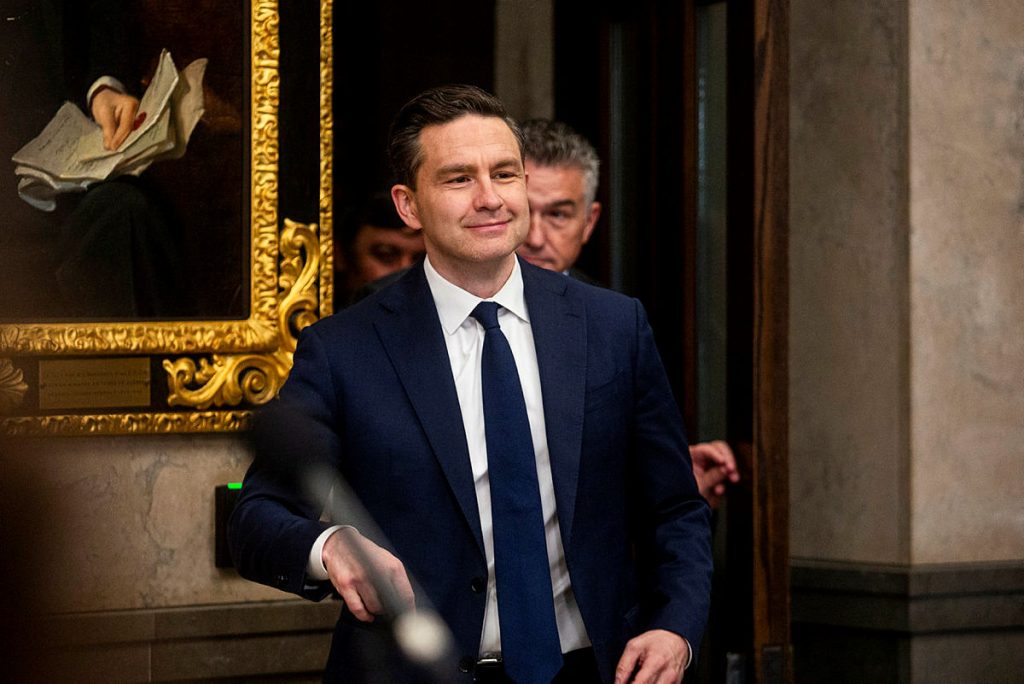‘Very, very unhappy’ with his party’s handling of nominations, former Conservative Senate leader Plett not ruling out running for national council

Former Manitoba Conservative Senator and party president Don Plett says he’s “very, very unhappy” with his party’s conduct of nominations in the 2025 election cycle, and is not absolutely ruling out a bid for a seat on the party’s highest-elected governing body at the January 2026 biennial policy convention in Calgary.
“I don’t think anybody ever says, ‘Nothing will ever happen,’ but right now that [national council election] is not very high on my agenda,” said Plett with a laugh in a telephone interview with The Hill Times.
When asked about how priorities move up and down in life, and whether the idea of running for the national council could move up, he said: “Absolutely, they do. Things move all over the place,” he again said with a laugh.
Plett, who was appointed to the Red Chamber by then-prime minister Stephen Harper and served as the opposition leader from 2019 to 2025, retired last month at the mandatory age of 75. He also served as the Conservative party president from 2002-2009.
Since losing the April 28 election, top Conservative Party officials have been under intense criticism for failing to unseat the Liberals and about how recent candidate nominations were handled. For months, disqualified nomination hopefuls have been going public with allegations of favouritism, claiming senior officials either blocked them from entering the contests, or denied access to application portals.
Some say they were encouraged to raise substantial amounts of funds with the impression it would help improve their chances—only to be turned down. Others claimed of having submitted complete applications and waiting for months, and then being told their papers were “incomplete.” In a number of ridings, the party failed to give the required two-week notice before closing nominations. In certain cases, candidates discovered they had been bypassed only after the party appointed someone else—sometimes individuals who had recently been Liberal supporters and donors.

According to candidate nomination rules, the party has to provide a two-week notice to riding association members in order to close a nomination contest. The rules, however, also give the executive director the authority to shorten the process in consultation with the party president and relevant national councillors.
The controversy has led to frustration, with some former potential candidates even cancelling their memberships and joining the Liberal Party. Up until early this year, Conservative nominations were seen as near-guaranteed tickets to the House of Commons. For more than 18 months, the party led in national public opinion polls—at times leading by as many as 27 points. The 2025 election was widely expected to deliver a Conservative super-majority of more than 200 seats, and for this reason nomination races drew more interest from potential candidates. The party raised record-breaking amounts of money, outraising the combined totals of the Liberals, NDP, and Bloc Québécois, while candidates signed up thousands of new members at $15 each.
Disappointed contenders say they contacted national councillors and MPs of neighbouring ridings with their concerns, but did not receive solutions. Many began speaking out publicly in the lead-up to the start of the campaign, convinced that internal party decisions—not merit—kept them from carrying their party’s banner in the election.
In response to these complaints and to prepare for the next federal election cycle, the party’s national council voted at its June 14 quarterly meeting in Ottawa to establish an internal ad hoc committee to review the nomination process and rules. As of press time, the committee’s membership had not been finalized, though Christina Mitas, an Ontario national councillor, was expected to be the chair of the committee, according to Conservative sources.
Meanwhile, Plett told The Hill Times that he has seen a number of media reports and heard from individuals suggesting that the nomination process was not transparent for some potential candidates. He said that according to some estimates, the party appointed around 90 candidates after the writs were issued—a figure he called unusually high. While the Conservative Party’s constitution permits appointments once an election is called, the retired Senator questioned why—after approximately two years of pushing the Liberals to call an election—the party hadn’t completed more contested nominations.
Reflecting on his own time as party president, Plett said that he and Doug Finley, former Conservative campaign manager and director of political operations, had also made post-writ appointments—but only in a handful of ridings.
“When you have as many complaints as what there was, and as many people that were not allowed to run—that I thought were very reputable people—that leads me to believe that somebody was appointing candidates because she wanted certain candidates to be able to run and that should not happen,” said Plett.
When asked who he was referring to when he said “she,” the former Senate leader declined to say: “Let’s just leave it at that.”
Plett added that the Conservatives must prioritize transparency in party nomination elections.
“We need to either say, ‘We’re going to appoint candidates,’ and if we don’t want to say that, and we want to say ‘We’re transparent,’ then we need to have transparent nomination races,” said Plett. “And so, without really getting too far into it, I was very, very unhappy with the way the nomination process ran.”
By press time, the Conservative Party’s communications office did not reply to requests for comment for this article, including answering how many appointments the party made in the last election. The Conservative Party’s nomination rules allow the executive director of the party to “alter, abridge or suspend any section or sections of the rules as they see fit” once the election is called. To do this, the executive director is required to consult with the party president and chair of the national candidate selection committee.
“Any such decision shall be final and binding and is not subject to appeal challenge or review on any grounds whatsoever,” states the party’s nomination rules.
The Conservative Party’s next policy convention will take place Jan. 29-31 in Calgary where the delegates will elect all 20 members of the national council. Conservative Leader Pierre Poilievre will also face a mandatory leadership review at the convention, as required by the party’s constitution following an election loss.

D’Arcy Keene, a Halton Hills, Ont., municipal councillor who was a potential candidate in Milton East-Halton Hills South, said he was not able to even file his application before the last election because the process was conducted online and he was never granted access to the portal. He criticized the central party high-ups overseeing the process for having total control over candidate elections, adding that local riding associations should have a much greater role.
Keene said that riding associations should be responsible for encouraging and recruiting local potential candidates, facilitating a fair nomination process, and respecting the outcome—regardless of who wins. He said that whether applications are submitted on paper or online, the process should be managed at the local level, not dictated by the national office. Keene also said that if an application is disallowed, the applicant should receive the reasons in writing, and be granted the right to appeal to the national council.
The Conservative Party declared former Ontario cabinet minister and MP Parm Gill as the acclaimed candidate in Milton East-Halton Hills South even though Keene and others were interested in seeking the party nomination. Gill lost in the last election by a margin of 21 votes.
“There should be very strict rules in place as to when the party can appoint a candidate, and I would prefer it to be back the way it used to be, which would be [that] only those ridings that were unsuccessful in getting a candidate to run for nomination by the time the writ is dropped are the ones that you allow to have sort of an emergency appointment of a candidate,” said Keene.
Some candidates who spoke on a not-for-attribution basis with The Hill Times said the party should set a clear timeline for completing nominations in each riding. Candidates shouldn’t be left waiting for months—or in some cases, more than a year. Timely nominations, they said, allow candidates to begin their campaigns sooner, which is crucial. They also highlighted the importance of better communication, urging the party to keep potential candidates regularly updated on the status of the nomination process, and when to expect the election to happen.
Darrell Shelley, a potential Conservative candidate in Long Range Mountain, N.L., told The Hill Times that he was blocked from seeking the nomination, but was never given a reason. He said that party officials were initially very welcoming when he began attending local events after Poilievre won the leadership election. He said that his previous candidacy for the People’s Party of Canada in 2021 was public knowledge, and that it did not raise any concerns with the Conservative Party. Shelley said he also spoke with the party’s Atlantic assistant, and had several phone conversations.
However, after submitting his nomination application, Shelley said the party raised concerns about the required signatures, which he said he addressed. Despite this, Shelley said the party office later stopped taking his calls. He said that he travelled all the way to Ottawa hoping to meet with senior party officials to resolve any concerns, but they refused to meet with him. Eventually, he received an email stating that his application was incomplete, though no specific reason was provided.
“These people need to have oversight, there needs to be somebody from the national board, and there needs to be communication with the prospective candidates,” said Shelley.
The Hill Times






 LICENSING
LICENSING PODCAST
PODCAST ALERTS
ALERTS













